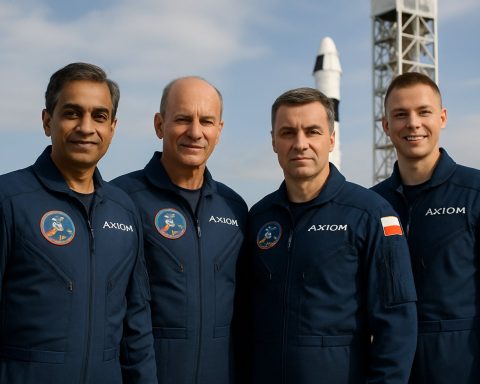- Blue Origin’s New Shepard rocket launched an all-female crew, including Gayle King and Katy Perry, highlighting women in space exploration.
- The mission faced both praise and criticism, with supporters highlighting scientific advancements and critics questioning its societal value.
- Celebrities and public figures like Olivia Munn and Emily Ratajkowski expressed skepticism about prioritizing personal achievements over collective progress.
- U.S. Secretary of Transportation Sean Duffy raised questions about the definition of an “astronaut” and the significance of the crew’s role.
- The mission sparked essential discussions on the future of commercial space travel, inclusivity, and the benefits of space exploration for humanity.
Beneath the vast Texas sky, Blue Origin’s New Shepard rocket propelled a unique crew into the edge of space. This unprecedented journey featured a powerful ensemble of women, including media magnate Gayle King, pop sensation Katy Perry, and Lauren Sánchez, who orchestrated the flight. Alongside them were STEM advocate Aisha Bowe, civil rights activist Amanda Nguyễn, and film producer Kerianne Flynn. Together, these women embraced the opportunity to showcase human innovation and exploration.
Amidst the anticipation and excitement, the mission also sparked a wave of skepticism and critique. While many applauded the all-female lineup for breaking barriers, others questioned the expedition’s purpose. Critics pondered the tangible benefits of such a venture, particularly in a world grappling with pressing challenges. Voices of dissent, such as Olivia Munn, urged for broader reflection on humanity’s priorities, asking provocatively what real value such flights offered humanity.
The flight endured a barrage of commentary as it captured the public eye. On digital platforms, influential figures like Emily Ratajkowski and Olivia Wilde conveyed their reservations, challenging the narrative of personal achievement versus collective progress. Their pointed comments surfaced broader conversations about public and private interests in space exploration.
Yet, amid the clamor, supporters stood resilient. Gayle King defended the journey, acknowledging both the thrill and the gravity of participating in spaceflight. She pointed out that it represented more than just aesthetics; it was a collaborative effort with real scientific work aimed at advancing human knowledge. The astronauts included individuals working behind the scenes to conduct experiments vital to future missions and the broader understanding of our universe.
The debate over titles and contributions was further fueled by U.S. Secretary of Transportation Sean Duffy. Weighing in on social media, he questioned the label “astronaut,” citing official criteria needed to earn such a designation. According to him, riding along on an automated journey didn’t fulfill the stringent requirements of earlier pioneers who risked much in the name of progress. The distinction, he suggested, lies not in the journey itself but in the tasks accomplished during the flight.
Ultimately, the flight’s legacy remains twofold. On one hand, it highlights the ongoing conversation about commercial space travel’s role in our future. On the other, it underscores the need for a more inclusive dialogue on who controls and benefits from the final frontier. The challenge for humanity lies in navigating these complex conversations, ensuring that all voices are heard in determining our path forward. As we journey further into the cosmos, this mission prompts us to reflect on our collective aspirations versus individual ambitions, urging us to chart a course that benefits all of humanity.
Space Glitz or Genuine Progress? Unveiling the Real Impact of Blue Origin’s All-Female Flight
Understanding the Release of Blue Origin’s All-Female Spaceflight
Blue Origin’s New Shepard mission featuring an all-female crew, including luminaries like Gayle King and Katy Perry, drew considerable attention as it aimed to redefine perceptions of space exploration. This mission was a milestone not just for its unique crew but also for raising pivotal questions about the future of commercial space travel. However, the mission’s true implications stretch beyond initial headlines, touching on societal, scientific, and economic dimensions.
Key Insights and Broader Impact
1. Empowering Women in STEM: One of the primary purposes of this mission was to inspire future generations of women to pursue careers in STEM fields. By spotlighting women like Aisha Bowe, a STEM advocate, the mission aimed to bridge gender gaps in science and technology. According to the American Association of University Women, increasing representation of women in STEM is critical to fostering innovation and economic growth.
2. Critique of Economic Allocation: Critics, such as actress Olivia Munn, highlighted the necessity to allocate resources effectively. The conversation circles back to whether billions spent on space tourism can be better utilized addressing pressing earthly challenges like poverty, climate change, and global healthcare disparities.
3. Scientific Merit: Behind the star-studded lineup, scientific endeavors were embedded in the mission’s core. Experiments conducted aboard the New Shepard contribute to the advancement of human knowledge about suborbital microgravity environments, which can have implications on fields like material sciences and human physiology.
4. Commercial Space Travel Trends: The mission exemplifies the burgeoning industry of commercial space travel, which Morgan Stanley estimates could generate revenues exceeding $1 trillion by 2040. Blue Origin, alongside companies like SpaceX and Virgin Galactic, is democratizing access to space by providing suborbital experiences to civilians. This burgeoning industry is not merely about tourism but serves as a precursor to more extensive commercial enterprises like asteroid mining and satellite deployment.
5. Defining ‘Astronaut’: The debate around the term “astronaut” surfaced as the U.S. Secretary of Transportation noted that such titles have traditionally denoted individuals who actively pilot or conduct significant research during missions. This raises questions about how modern space missions should be categorized and the evolution of terminology as more people travel to space for non-traditional roles.
How to Evaluate Space Missions: A Practical Guide
1. Assess the Scientific Objectives: Determine whether the mission advances scientific understanding or technology development.
2. Consider Representational Impact: Analyze how the mission may influence diversity in STEM and space industries.
3. Evaluate Economic and Environmental Trade-offs: Weigh the costs of space missions against their economies and environmental impacts.
4. Understand the Industry Trend: Stay informed about the fast-evolving space tourism industry to gauge future opportunities and shifts.
Recommendations for Aspiring Space Enthusiasts
– Stay Informed: Follow industry leaders and scientific publications to keep up with new developments in space exploration.
– Engage in Public Discourse: Participate in discussions and panels that evaluate the ethical and societal implications of commercial space flights.
– Explore STEM Pathways: For those inspired by these missions, consider pursuing education and careers in STEM fields, which are pivotal to driving future innovations.
Conclusion
As companies like Blue Origin spearhead a new era of space exploration, it’s imperative to balance personal accomplishments with collective benefits. The discussion catalyzed by this all-female flight invites us to reflect on the paths we forge into the cosmos, ensuring they are inclusive, ethical, and productive for humankind. For further insights, explore Blue Origin and other key players in the new space race.







